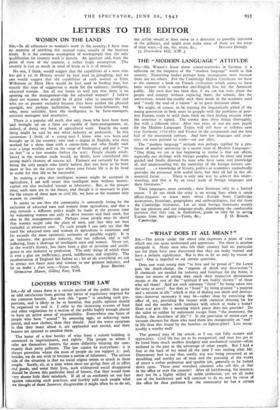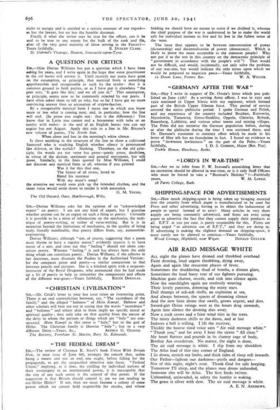WHAT DOES IT ALL MEAN ? "
SIR,—The article under the above title expresses a point of view which one can quite understand and appreciate. Yet there is another alongside it. Many men who felt their country had no particular use for them have now discovered that they are really wanted and have a definite significance. But is this to be so only by reason of war? One is impelled to ask certain questions.
Does one want young men " to love and be proud of " the Lewis gun, the depth-charge, the " engines of death and destruction "? If chemicals are needed for industry and furniture for the home, is there no means of seeing they reach their respective destinations except at the cost of the " spiritual if not bodily slavery " of those who sell them? And are such salesmen " freed " by being taken into the army or navy? Are they so " freed " by being granted " a purpose and a mission in life " which is that of dealing out death and destruc- tion—however necessary it may be—rather than by exercising the office of, say, providing the farmer with chemical dressing for his field and the mother with furniture with which to make a home? Does war give life a meaning which peace does not provide? Do the sailor or soldier by enlistment escape from " the monotony, the futility, the dreariness of life " ? Is the provision of motor-cars or vacuum cleaners for those who need them less recognisably an "end" in life than that found by the bomber- or fighter-pilot? Less recog- nisably a worthy end?
The general tone of the article, as I say, one fully accepts and appreciates. Civil life has yet to be reorganised, and man has got to be freed from much soulless drudgery and mechanical routine—often endured in the past to the advantage of other people. But I had a fear at the back of my mind all the time I was reading what Mr. Ommanney had to say that, surely, war was being presented as an ennobling and worthy as of man and the pursuing of the works of peace a rather pedestrian and ignoble job, generally to be looked down upon. These poor wretched salesmen who sell this or that in the office or over the counter! After all hairdressing, for instance, may not be a highly skilled or noble profession, yet we all make use of the hairdresser and will continue to do so, and by virtue of the office he thus performs for the community he has a certain niche to occupy and is entitled to a certain measure of our regard— as has the lawyer, but no less the humble dustman.
Finally if what the writer says be true for the officer, can it be said to be true to any extent for the bulk of the rank and file, after all the very great majority of those serving in the Forces?—



























 Previous page
Previous page